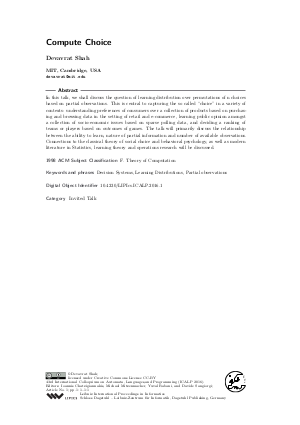Compute Choice (Invited Talk)
Author Devavrat Shah
-
Part of:
Volume:
43rd International Colloquium on Automata, Languages, and Programming (ICALP 2016)
Part of: Series: Leibniz International Proceedings in Informatics (LIPIcs)
Part of: Conference: International Colloquium on Automata, Languages, and Programming (ICALP) - License:
 Creative Commons Attribution 3.0 Unported license
Creative Commons Attribution 3.0 Unported license
- Publication Date: 2016-08-23
File

PDF
LIPIcs.ICALP.2016.1.pdf
- Filesize: 199 kB
- 1 pages
Document Identifiers
Subject Classification
Keywords
- Decision Systems
- Learning Distributions
- Partial observations
Metrics
- Access Statistics
-
Total Accesses (updated on a weekly basis)
0PDF Downloads0Metadata Views
Abstract
In this talk, we shall discuss the question of learning distribution over permutations of n choices based on partial observations. This is central to capturing the so called "choice" in a variety of contexts: understanding preferences of consumers over a collection of products based on purchasing and browsing data in the setting of retail and e-commerce, learning public opinion amongst a collection of socio-economic issues based on sparse polling data, and deciding a ranking of teams or players based on outcomes of games. The talk will primarily discuss the relationship between the ability to learn, nature of partial information and number of available observations. Connections to the classical theory of social choice and behavioral psychology, as well as modern literature in Statistics, learning theory and operations research will be discussed.
Cite As Get BibTex
Devavrat Shah. Compute Choice (Invited Talk). In 43rd International Colloquium on Automata, Languages, and Programming (ICALP 2016). Leibniz International Proceedings in Informatics (LIPIcs), Volume 55, p. 1:1, Schloss Dagstuhl – Leibniz-Zentrum für Informatik (2016)
https://doi.org/10.4230/LIPIcs.ICALP.2016.1
BibTex
@InProceedings{shah:LIPIcs.ICALP.2016.1,
author = {Shah, Devavrat},
title = {{Compute Choice}},
booktitle = {43rd International Colloquium on Automata, Languages, and Programming (ICALP 2016)},
pages = {1:1--1:1},
series = {Leibniz International Proceedings in Informatics (LIPIcs)},
ISBN = {978-3-95977-013-2},
ISSN = {1868-8969},
year = {2016},
volume = {55},
editor = {Chatzigiannakis, Ioannis and Mitzenmacher, Michael and Rabani, Yuval and Sangiorgi, Davide},
publisher = {Schloss Dagstuhl -- Leibniz-Zentrum f{\"u}r Informatik},
address = {Dagstuhl, Germany},
URL = {https://drops.dagstuhl.de/entities/document/10.4230/LIPIcs.ICALP.2016.1},
URN = {urn:nbn:de:0030-drops-63374},
doi = {10.4230/LIPIcs.ICALP.2016.1},
annote = {Keywords: Decision Systems, Learning Distributions, Partial observations}
}
